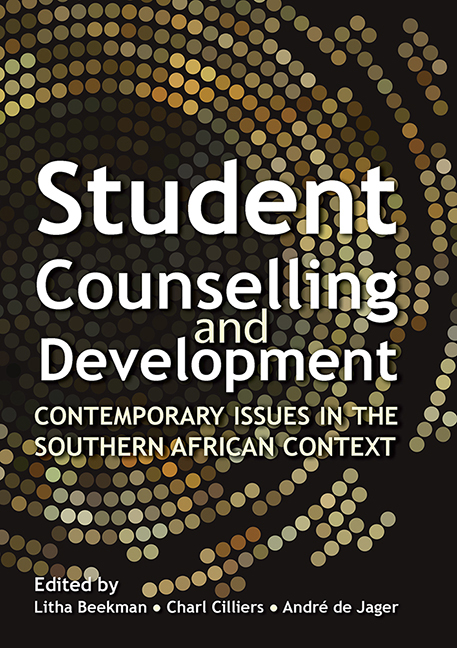Book contents
- Frontmatter
- Contents
- Figures
- Tables
- Preface
- Section 1 Development of Student Counselling and Development in Southern Africa
- Section 2 Theoretical Foundations of Student Counselling and Development in Higher Education
- Section 3 Services and Programmes Provided by Student Counselling and Development Units
- Section 4 Student Counselling and Development For Special Groups
- Section 5 Quality Assurance and Ethical and Professional Issues
- Contributors
- Index
Chapter 11 - Life-Skills Development Programmes in Higher Education
Published online by Cambridge University Press: 22 February 2020
- Frontmatter
- Contents
- Figures
- Tables
- Preface
- Section 1 Development of Student Counselling and Development in Southern Africa
- Section 2 Theoretical Foundations of Student Counselling and Development in Higher Education
- Section 3 Services and Programmes Provided by Student Counselling and Development Units
- Section 4 Student Counselling and Development For Special Groups
- Section 5 Quality Assurance and Ethical and Professional Issues
- Contributors
- Index
Summary
INTRODUCTION
This chapter focuses on the positioning, development and delivery of life-skills programmes in the context of higher education (HE). Key issues and aspects of the current discourses will be highlighted, with specific attention being paid to the role of the student counsellor and counselling division in the life-skills programme of an HE institution. The chapter is written against the background of South African HE where the academic support tradition is seen to have transformed gradually into an academic development tradition and is currently transforming into a holistic and comprehensive HE development tradition. The shift in emphasis from the supportive approach to the developmental approach is critical in understanding current discourses on and trends in life-skills programmes in HE.
CHANGING ROLE OF THE STUDENT COUNSELLOR IN THE CONTEXT OF HIGHER EDUCATION
In discussing the topic of life-skills programmes it is important to step back for a moment and focus on the role of the student counsellor in this regard. The traditional roles of student counsellors and counselling divisions (departments, directorates, centres, bureaux and others) have been to respond to the specific emotional and relational needs of the students of an institution. It can be said, based on the advantage of reflection, that this was primarily a reactive role. Counsellors marketed and promoted the support function to the student population and then waited for students to report or alternatively be referred for assistance, support or remediation.
In contrast to the traditional role of the student counsellor, the counsellor now finds himself or herself increasingly involved in planning and facilitating the student's holistic learning experiences in a proactive manner. The counsellor has now become directly involved in learning experiences (including skills for living and learning) purposefully constructed to enrich and develop the student to his or her optimal potential by graduation time. This implies a proactive planning and facilitation of learning, personal and social development outcomes for the student. It further implies that the counsellor increasingly deals with holistic and cross-functional aspects of the student's life and development, as opposed to the traditional “out-of-class” focus.
The role of the counsellor has then changed and what used to be a clear differentiation between the academic development practitioner and the clinical worker has now become a diffused function with only subtle differences in emphasis.
- Type
- Chapter
- Information
- Student Counselling and DevelopmentContemporary issuesin the Southern African Context, pp. 211 - 224Publisher: University of South AfricaPrint publication year: 2012
- 1
- Cited by



